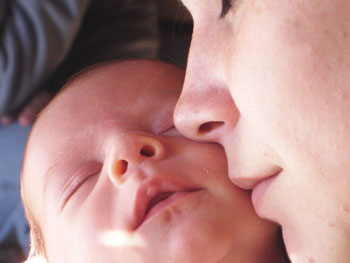Babies and toddlers are just as much at risk of dental decay as an older child or adult. Caring for your baby’s teeth needs to begin early. By looking after your baby’s first teeth, you’ll provide your child with essential oral hygiene habits as they grow and develop.
Dental hygiene should begin shortly after a child is born. After every feeding a clean, warm wash cloth or gauze should be used to gently cleanse the inside of the mouth.

Dental ailments that your baby could contract
Early Childhood Caries
Early Childhood Cavities (ECC), more commonly known as “baby bottle tooth decay” is a condition that affects children up to the age of three, or as long as they remain using a bottle. ECC may indicate the potential risk for severe tooth decay when the child develops his adult teeth.
ECC is caused by:
- Sugars and carbohydrates in the child’s diet.
- Beverages that contain sugar such as milk, infant formula, fruit juice, or any other liquid that is sweetened with sugar.
- Bacteria transferred from the caregiver to the child.
- The frequency of feedings.
- Allowing a child to fall asleep with bottle that contains any liquid other than pure water.
Thrush
Thrush is a treatable fungal infection caused by Candida (yeast), often appears in areas of the mouth that may have torn tissue, caused by the constant sucking on a pacifier, bottle, or during breastfeeding. The tiny tears remain moist and, if not removed manually, the yeast may cause the painful condition.
Signs of thrush include:
- White patches that appear to coat the tongue, inside tissue of the cheek, and gums.
- Irregular-shaped patches that are not able to be wiped away, sticking to the tissue.
- Pain when feeding or using a pacifier.
If left untreated, a nursing mother may develop thrush on her breast, although is not typically considered contagious. See your doctor or dentist and he may prescribe a medication to clear up the infection.
You can prevent early childhood decay by:
- Offering a pacifier rather than a bottle during naps and bed time.
- Speak with your dentist for advice on how to expose your child to fluoride, if it is not available through your water supply. Fluoride is recommended by the Australian Dental Association to strengthen teeth, which may prevent tooth decay.
- If using a bottle during periods of sleep, fill the bottle with only pure water.





